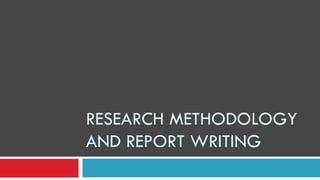The document discusses various aspects of research methodology including types of research, the research process, and criteria for good research. It describes the main types of research as applied, basic, correlational, descriptive, ethnographic, experimental, exploratory, and historical. The research process involves defining the problem, reviewing literature, designing the methodology, collecting and analyzing data, and interpreting and reporting findings. Criteria for good research include having a clear definition, explainable design, sufficient data, and validity and reliability checks.





































